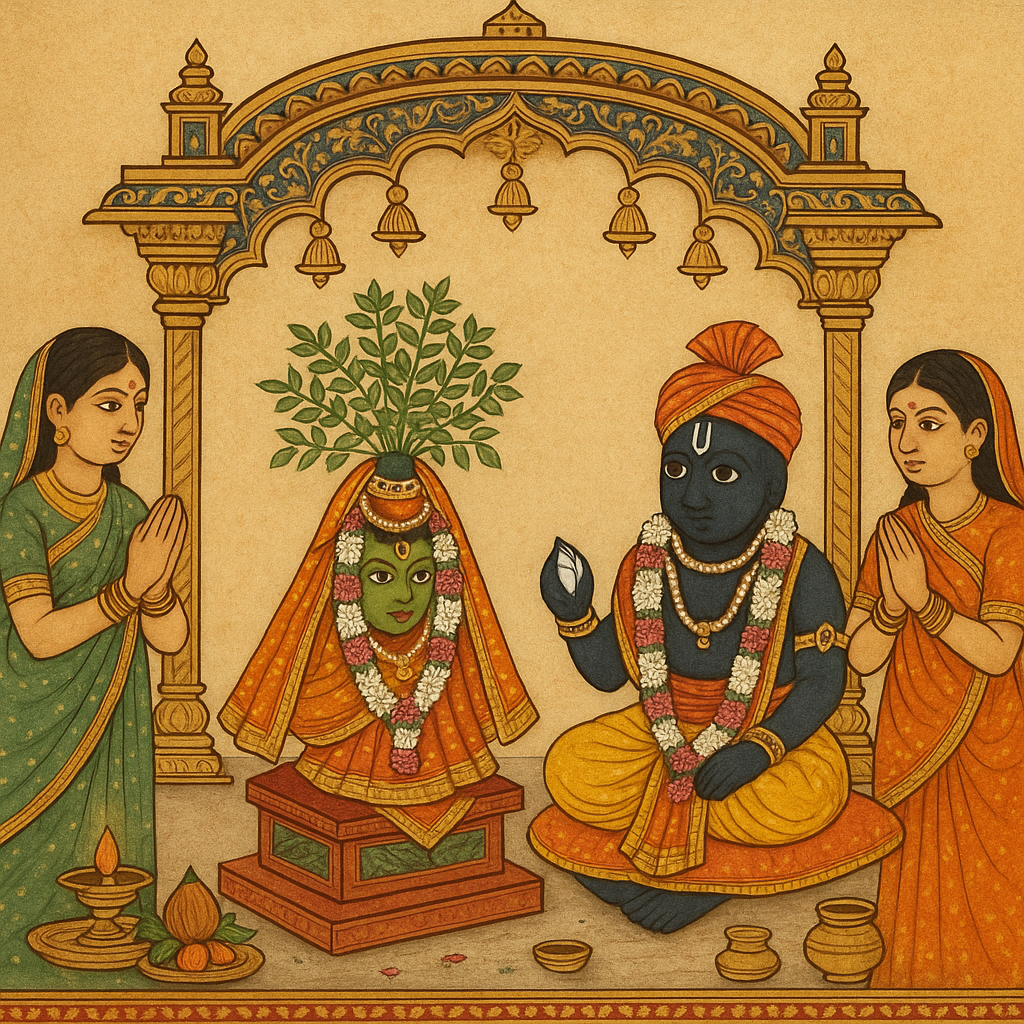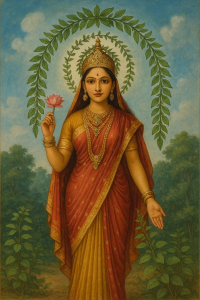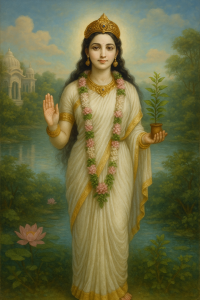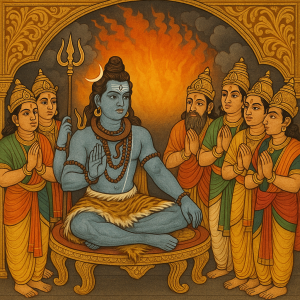The Divine Union of Love and Devotion
One of the most auspicious and beloved festivals in the Vaiṣṇava calendar is Tulasī Vivāha, the ceremonial marriage of Tulasī Devī and Lord Śālagrāma (a form of Viṣṇu). This sacred festival takes place on the Dvādaśī day of the bright fortnight in the month of Kārttika (October–November), and it is celebrated with joy, reverence, and festivity in temples and homes across India and the world.
This marriage is not symbolic; it commemorates the actual eternal relationship between Tulasī Devī and the Supreme Lord in His Śālagrāma form.
The Background of the Marriage
In her past life, Tulasī Devī was the devoted wife of Sankhacūḍa, a powerful demon blessed with invincibility due to her chastity. Tulasī was completely dedicated to her husband, and her loyalty protected him from death.
However, as described in earlier stories, her spiritual destiny was not to remain with Sankhacūḍa but to become the beloved of Lord Nārāyaṇa. Through divine arrangements, her chastity was broken, Sankhacūḍa was liberated, and Tulasī, filled with pure devotion, gave up her material form and was transformed into the sacred Tulasī plant.
At that moment, the Lord promised her: “You shall eternally remain dear to Me. In your spiritual form, you will become My wife as Śālagrāma’s consort, and every year your marriage will be celebrated by My devotees with great devotion.”
The Wedding Ritual
On Tulasī Vivāha day, devotees prepare for the wedding by:
- Bathing and decorating a Tulasī plant as a bride with colorful clothes, ornaments, bindī, and garlands
- Placing a Śālagrāma Śilā dressed in dhotī and turbans beside her as the groom
- Building a small mandapa (wedding canopy)
- Inviting family and guests to participate in the ceremony as one would for a real wedding
- Performing the vivāha-saṁskāra (wedding rites) with Vedic mantras and offerings
- Feeding prasāda to all present in celebration
This wedding is often observed with singing of bhajanas, chanting of Tulasī-kīrtanas, and recitations from the Purāṇas describing Tulasī’s glories.
The Spiritual Significance
The Tulasī Vivāha is not only a sweet pastime—it represents the union of bhakti (devotion) and the Lord, the eternal connection between the devotee and Bhagavān.
By performing or attending this wedding, one earns the merit of conducting hundreds of yajñas and marriage ceremonies. Those unable to perform grand sacrifices or travel to tīrthas can receive equal or greater benefit by offering even a simple flower to this divine marriage.
The Lord is most pleased when His devotees are honored, and on this day, Tulasī is honored as His beloved queen. It is a festival of love, union, and the victory of bhakti over all material obstacles.
Lessons to Be Learned
1. The Marriage of Tulasī and Śālagrāma Symbolizes the Perfection of Bhakti
Just as Tulasī Devī becomes one with the Lord in marriage, so too the devotee’s pure love culminates in eternal union with the Lord. This is not impersonal merging, but loving relationship. Śrīla Prabhupāda taught that our goal is to serve Kṛṣṇa eternally with affection, and this marriage represents that perfection.
2. The Lord Honors His Devotees More Than Himself
By marrying Tulasī, the Lord shows that He is conquered by devotion, not by grandeur. Even the Supreme Person submits to the love of His bhakta. This teaches us that humble devotion is greater than opulence.
“The Lord becomes the property of His devotees.” – Śrīla Prabhupāda
3. Celebrating Festivals Deepens Our Relationship With Kṛṣṇa
Participating in Tulasī Vivāha is not merely a tradition—it is an opportunity to enter into divine pastimes, to feel the sweetness of serving the Lord and His devotee, and to gain immense spiritual merit through joyous worship.
4. Worshiping Tulasī Invites Kṛṣṇa’s Presence Into the Home
Homes that celebrate Tulasī Vivāha become spiritually vibrant, filled with auspiciousness and the Lord’s mercy. Śrīla Prabhupāda emphasized that by honoring such Vaiṣṇava events, we attract the blessings of the Lord’s eternal associates.
5. Every Devotee Can Participate in Divine Pastimes
One does not need to be learned or wealthy to celebrate this festival. Even a simple arrangement with a few flowers and a heart full of devotion pleases Tulasī and the Lord. Bhakti is for all, and every home can become a Vṛndāvana by celebrating with love.



